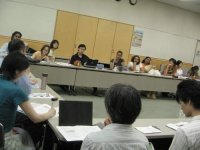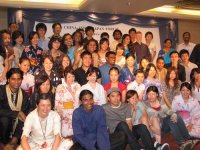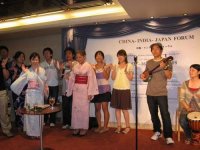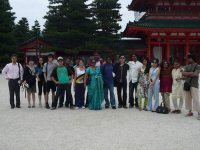
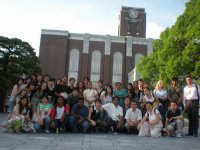
Publicado em 1º de dezembro de 2008
Traduções disponíveis em:
China-India-Japan Forum: Responsible Youth working towards peace and cooperation in Asia
![]() Role of Women
Role of Women
![]() Climate Change and Water
Climate Change and Water
![]() Education
Education
![]() China-Japan-India Forum Declaration
China-Japan-India Forum Declaration
| Pacific Asia-Research Center (Tokyo, Japan), Global Citizens for Sustainable Development (Bangalore, India) and Center for Cross-Cultural Studies, Beijing University (Beijing, China) organized the China-India-Japan Forum from 11th July to 21st July 2008 in Japan. This Forum was organized with kind support from Charles Leopold Mayer Foundation for the Progress of Humankind (FPH), Paris, France and Asia/Pacific Cultural Center for UNESCO, Tokyo, Japan (ACCU). Kyoto University, Kyoto and United Nations University, Tokyo, Japan were other supporting partners of this Forum which hosted Open Discussion Forum and thematic Session on Climate Change and Water respectively. The Forum brought together 12 Chinese, 12 Indians from their respective countries and more than 100 Japanese youth who participated at the different programmes interspersed during the 14 day schedule. The three themes for this year were: Education, Environment (Climate Change and Water) and the Role of Women as decided at the last China-India Forum in India in August 2007. Ms. Shoko Uchida (Secretary General, PARC) from Japan, Anugraha John from India and Prof. Zhao Baisheng from China were the principal organizers of the Forum. Advisors of the China-India-Japan Forum, Prof. Jin Siyan, Prof.John Clammer and Prof. Jeeven Kumar were also actively involved in Japan during the programme. It was the incredible effort of PARC team members especially Ms. Shoko Uchida, Ms. Noami, Ms. Koike Natsumi, Ms. Erika and Ms. Kazue Matsubara (student at Kyoto University) who contributed to the success of the 14 day programme with their excellent coordination skills. |
The Chinese and Indian participants first arrived at Kyoto. In Kyoto the guests were welcomed and guided by young leaders like Kazue Matsubara, Hiroaki Yutani, Shinichi Endo, Misaki Matsumura, Erina Mukai, Ayumu Takemura, Sayaka Kawaguchi along with many other volunteers. It was with the kind assistance of Prof. Junichi Mori we conducted an Open Discussion Forum at Kyoto University. Prof. Mori gave the platform to young leaders and refrained to speak much at this occasion but in his short speech highlighted the importance of this tri-nation collateral for the betterment of Asia and encouraged activities of such a Forum.
In Kyoto, visit to places such as golden temple, Kinkaku-ji, the Enryakuji temple monastery, Heian Jingu Shrine, Niji jo Castle, Nanzenji temple, Kyoshoji temple, Arishiyama and eating traditional Japanese food made everyone feel they were in paradise. In Tokyo, the participants were accommodated at the Olympics Village in Yoyogi, Tokyo which was in good condition although it was built in 1964 for the Olympics in Japan. Visit to Tokyo-Edo Museum gave an insight to the history to Japan and Tokyo.
A cultural programme to mark the celebration of China-India-Japan Forum and the Japan-India Forum brought everyone together to enjoy some good wine, dance to the tunes of Chinese, Japanese and Indian Bollywood music, and wear national and traditional clothes.
After having being immersed into the Japanese culture and having understood a little bit of Japan, It was time for intellectual discussions and presentation of papers on the three different themes. Inspiring speeches by Dr. Masatsugu Kimura, Director of Planning Division, ACCU, Prof. John Clammer, Prof. Jeevan Kumar, Prof. Zhao Baisheng and Prof. Jin Siyan set the tune for the same. Excellent papers with insightful knowledge and proposals and ideas for positive change were presented by the following participants in the respective thematic:
Sangeetha Raju presented a pictorial depiction of the women in India and touched upon the status of women through ancient, medieval, British occupied India and post Independence. Smeetha Rangwani on the other hand spoke about women rights, and the present issues and concerns of women. She also gave illustrations of the women role models in India who were and are able to deal with such issues.
Xie Qong presented on the theme, ‘Women’s Reading and Writing in the Future Century’. She called for the attention of all women especially Chinese women to participate actively in contributing to the modern literature so as to make sure their voice is heard and this would further strengthen women’s subjectivity. Zhang Shuo presented on the theme, ‘Women in Environmental Protection’. She was convincing to state that it is women who contribute to the well-being and sustainable development of their communities and nations, to maintain earth’s ecosystems, bio-diversity and natural resources.
Kanako Hayashi, was the only Japanese presenter who was very impressive with the statistical analysis of the issues of women in ‘developed’ Japan. She brought to the light that how the Japanese society is biased and women are subject to internal violence. She suggested that Domestic-Violence Helpline for women was essential as the need for Health education in Japan for women.
The session of Climate Change and Water was hosted at the United Nations University, Tokyo, Japan with the kind assistance of Prof. John Clammer (Advisor to the Rector, UNU). The environmental expert, Dr. Srikantha Herath, Head of Environmental Division gave an inspiring speech at the beginning of this session and brought to the notice of the participants of the various programmes and activities of UNU which acted more as a think tank was implementing.
Cheng Sibo spoke on the development model of cities especially Shanghai and how it was important to seek a balance between environmental protection and economic growth. Zhang Jin emphasized on the connectivity of human beings with nature and spoke about the Lake Poyang model.
Junya Tanaka & Yuko Mistumoto from A Seed Japan (non-profit organization) shared their experience with the recently concluded World Youth Summit prior to G8 summit held in Japan in July 2008. A statement prepared by the youth participants on Sustainable Development and Climate Change was handed over to the Minister of Environment in Japan. Rachel Markman and Go Noguchi (representing the Japan Water Forum) presented on the concept of Virtual Water. The alarmed every one of the growing food crisis and the need for self-sufficiency and growing local. They encouraged not buying private water but using locally available water. It was also a time to share about the many youth activities they were organized by the Japan Water Forum.
Anugraha John presented on issues concerning water management and efficient usage of the same in the context of food crisis, climate Change and such factors. Vikram Aditya presented on the eco-system response to Climate Change across the globe. He proposed strategies for mitigation and asked everyone to join to work towards concrete targets for achieving a sustainable world.
Participants could capture some visual chronicle to ground reality on water and climate change concerns through the Global Citizens Climate Change and Water Film Festival which was hosted during the Forum.
Chen Dunfei in his presentation was a critique to the Chinese mainstream education system. He also raised questions over the population status of China. And raised doubts how the country would cope if all of the Chinese citizens had degrees and not enough jobs for them.
Wang Jiake who has volunteered her time briefly at the Stars and Rains Education Institute spoke about the concerns for autistic children in China and presented a case study of the same.
Sudhir Selvaraj presented on the theme, ‘Education in India’. He spoke us through the transformation of Indian education system right from Universities of Nalanda and Takshashila to our Indian Institute of Management and Technology.
Nikhil Infant presented on the theme ‘Purpose of Education’. He summarized the primary, secondary and higher education system in India. He narrowed down to some concerns and shared success stories in the Indian education system.
Kanae Masuda like others also spoke about the transformation of Japanese education system since 17th Century. In her presentation she emphasized on two educational systems during the Meiji Restoration government and post World War II based on the American model.
Jun Ooka on the other hand was very critical about the mainstream education and had an interesting presentation on the Meltdown of the Educational system in Japan.
The DVD presentation of the ACCU-UNESCO Education program was screened for all participants. This was helpful for the participants to understand ACCU as an organization which is involved in Sustainable Development programme all over Asia, especially in the education sector. Mr. Kono Mansouri and Ms. Maya Nakajima made a joint presentation and urged to look education beyond careers and entrance exams.
All these presentations were well followed by vibrant discussions and a boaster for participants to be motivated to go back and work in these themes for their own country and globally.
China-India Forum was invited to participate at the first Asian Forum on Solidarity Economy held in Manila, Philippines in October 2007. Since then this Forum has made an attempt to spread the concept of Solidarity Economy. An introduction to Solidarity Economy was done by Anugraha John which was supported with comments from Prof. Jeevan Kumar and Prof. Zhao Baisheng.
One of the most remarkable and unforgettable time was spent at the Yamagata Prefecture according to the participants. The participants had an opportunity to see, feel and work in the farms of Japanese farmers and experience rural area of Japan. A presentation by senior officer at the Yamagata Agriculture Office gave them official records and present scenarios of the agricultural situation. And visit to witness sites of programmes such as Rainbow Forums were an eye opening.
The participants acknowledged that China-India Forum had now expanded its wing to China-India-Japan Forum and paved way for many bilateral Forums; Japan-India Forum, Korea-India Forum, Asia-Africa Forum, tri-lateral Forums; China-India-US Forum and many multi-lateral Forums that would work independently but at the same time are connected and will work towards peaceful world as envisioned by these participants.
As Education was one of the key themes for discussion at this Forum it was anonymous decision by both Chinese and Indian participants to support local education initiatives and programmes in their own countries and especially those of which the participants have actually been involved in. The Chinese participants will support the Rains and Smiles Children’s Programme, Beijing, China and the Indian participants, the Living Hope Children’s Home in Bangalore, India. For Japanese participants, it was very important to support and strengthen the journey of the Asian Forum for Solidarity Economy schedule in November 2009 hosted by PARC.
The participants also pledged to work towards an overarching dream project of building an eco-logical and ‘learning for life’ school for the ‘under-privileged’ children in India as a symbolic expression of an Asian Citizens Assembly in 2010.
At the conclusion of the Forum a joint declaration was released:
China-Japan-India Forum Declaration
This declaration/statement was drafted and released by the participants of the China-India-Japan Forum on the 15th of July, 2008 at Olympics Institute, Yoyogi, Tokyo, Japan
We, the young people of China, India and Japan, recognize the emerging prominence of our nations in global affairs, and affirm to our responsibilities as citizens to building a more just, equitable and sustainable planet. We recognize the importance of gaining an understanding of each other’s rich and varied cultures and heritage in order to achieve the above. We acknowledge that environment, education and women are three poignant areas hugely significant to our nations, and where we can contribute the most to our shared growth
Environment: We believe that we need a regional and global development model that is sustainable, which relieves us of our dependence on fossil fuels and non renewable energy sources, and articulates economic expansion with conservation; We believe that there is a need to change people’s consciousness about environment, and this can only be achieved by changing mindsets at the grass roots, simplifying lifestyles and simulating the awareness of people. We understand that the 21st century is the century of environment, but before we start we must make friends across borders. Women: We strongly believe that empowerment of women is crucial for our regional advancement and constitutional and legal frameworks must be significantly strengthened in order to achieve this.
Education: We believe that education is crucial in advancing our region. We feel that school syllabi must incorporate teaching of sustainable development, peace and communal harmony in order to help youth gain a holistic view and awareness of global problems and enable them to learn from similar situations in other parts of the world. By taking steps such as Inter crossing college education and self taught and adult education, specially for the students who don’t have a chance at college education, will provide many young people with a viable career
Cross cultural sharing: We understand that sharing and experiencing each other’s cultures is crucial to forging strong regional partnerships based on trust and friendship. This can only be achieved by effective cross cultural experiences; student exchange programmes to learn other’s culture, increasing awareness of citizenship; encouraging creativity.
We declare our support for this statement in good faith and confidence, and commit to achieving the vision set forward here in spirit and in letter.

